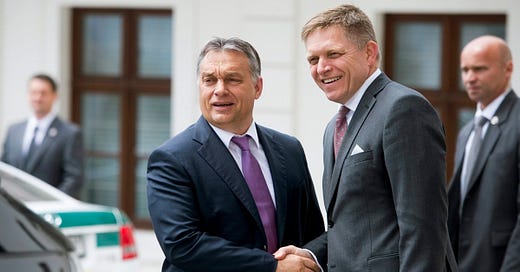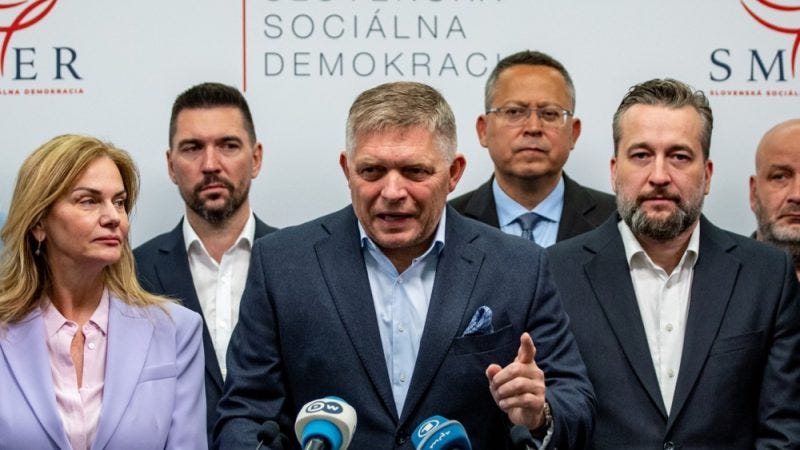Elections in Slovakia and the Resurgence of the Visegrad Group
And what is means for the 2024 European elections.
Last Sunday’s Slovak elections have brought former Prime Minister Robert Fico back into power, despite his previous involvement in a murder case and his alignment with pro-Kremlin policies.
Meanwhile, the election also strengthens Hungarian Prime Minister Viktor Orban, who shares close ties with Fico.
These events are expected to amplify discussions around the rule of law and pro- versus anti-European positions in the upcoming European elections.
400 Million Votes is a bi-weekly newsletter covering the 2024 European elections campaign. Don’t miss any important updates and stories. Subscribe to 400 Million Votes.
If you don’t know if 400 Million Votes is for you, you can read about us.
And now, to your newsletter.
Putin’s second man in Europe
Out of the poll. Slovak voters decided to call back former Prime Minister Robert Fico to rule the nation.
Fico, who resigned in 2018 following his involvement in the murder of journalist Ján Kuciak, is a supporter of the Kremlin and vowed not to aid Ukraine in their conflict with Russia.
One positive note: Fico won’t be able to rule on his own. His party having secured only 23 percent of the votes, he will have to come to terms with the Hlas social-democratic party. Unless the latter decides to go with pro-Western, liberal Progressive Slovakia (PS), which arrived second at 18 percent—right above Hlas, which secured 15 percent.
A word on the campaign. Slovakia's democratic parties battled against an incredibly strong Russia-backed propaganda machine. Fico has been elected on a pro-Putin platform in a country that is prone to listen to Russia’s rhetoric. That’s a challenge that the European elections will have to face. So much so that European Commissioner Věra Jourová “said the election was ‘a test case” of how vulnerable European elections are to Moscow’s “multi-million-euro weapon of mass manipulation.’” POLITICO reported last week.
What about Putin’s #1 man in Europe?
This election did not please Brussels. But is certainly did in Budapest.
Viktor Orban will find his old pal Fico. It is highly expected that the two will now veto about every European project aiming at helping Ukraine against Russia’s brutal invasion.
But the strongest problem that the Slovak election raised is the possibility of a resurgence of the Visegrad Group on Europe political stage.
Visegrad’s not dead…
The immediate consequence of the resurgence of the anti-Europe rhetoric in Slovakia and its continuation in Poland and Hungary will, undoubtedly, reinforce the virulence of the Visegrad group.
This informal discussion forum gathers our three protagonists and Czechia. It has been known in the past years for undermining the efforts for greater European unity.
But the war in Ukraine had split the group, with Poland leading the EU’s efforts to aid the invaded neighbour while Hungary’s Viktor Orban remained Vladimir Putin’s man in Europe.
Yet, since the tensions between Ukraine and Poland escalating over grain import issues, the latter could be interested in reforming the group, if only to reaffirm its opposition force to Brussels.
For Hungary, the resurgence of the Visegrad group is excellent news. Isolated on the European stage since the start of the war in Ukraine, Viktor Orban had the greatest difficulties in opposing the stakings of sanctions against the Kremlin and its cronies.
… expect turbulence
The impact on the Slovak elections is easy to understand: Rule of law and pro- vs. anti-European positions will remain a major theme of the upcoming European elections campaign.
Thank you for reading. Now that you reached the end of the article, it probably means that you liked what you read.
If so, we would kindly ask for your help. You can help 400 Million Votes grow by sharing this piece with a friend, a colleague, or on your social media.
Thank you. Don’t forget to subscribe to 400 Million Votes.






